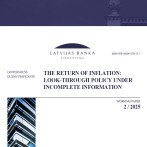Annual inflation still not in the positive range
According to the data of the Central Statistical Bureau (CSB), the consumer price level in February was by 0.5% lower than in February 2015. As expected, this was caused by a further reduction of energy prices, i.e., because of the drop in the price of oil in the global market; also, the tariffs of natural gas for the industrial consumers dropped domestically. Some service prices, for which an untypical drop was observed in January, also did not yet return to their previous level.
The drop in resource prices in February gradually abated. Oil prices gradually returned to a rising trend, which is continuing in March (currently Brent oil price is over 40 USD per barrel). Thus the February fuel price was still 3.3% lower than in January, but in March it might no longer go down. The world food and agricultural prices, according to the Food and Agricultural Organization (FAO) data in February, with stock levels diminishing, even rose somewhat in some product groups.
The drop in the prices of services of passenger transport by air observed in January continued in February, when the sales of package holidays were no longer topical, yet the prices of these services did not fully return to their previous level. The increase of the service component impact on inflation was impeded also by the fact that in February of last year the public transport ticket prices in Riga were raised substantially and the effect of this factor on the annual inflation does not really apply twelve months later. However, this year the prices of other services, e.g. financial and insurance, hotel, hospital and cultural ones rose this February.
Overall, the prices of services and the so-called "other tradable goods" are rising slightly slower than on average in 2015, in part as a result of a lower pressure from cost side. Yet the impact of these components of core inflation on total inflation abated somewhat already over 2015 and may have reflected the tendency of the population to increase their savings.
Although in 2015, the growth of gross domestic product was underpinned by rises in income and consumption, it followed from population surveys that in the next twelve months, people were planning more large purchases, for instance, in the area of home improvement. In the surveys of February and first quarter of this year, this trend did not continue: people could make the purchases planned in previous months, slightly fostering demand, yet the belief that in the next twelve months, prices could rise at a slower rate or drop, was reinforced in February surveys.
The current trend in the global resource prices no longer points to a further drop in prices. A positive contribution to inflation till the middle of the year will still be made by the yet to be implemented changes in taxation, for instance, the introduction of alcohol excise tax and value added tax to the housing management costs. The rise in income, however, this year is expected to be slower (the impact of legislation to wage rises is expected to be neutral in contrast to previous years) and thus, overall, the level of average annual inflation will still remain at a very low level.
Textual error
«… …»






